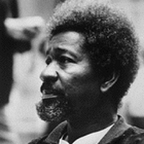Oke Ogun: 3 days of Travel & My Story
Last week, I handed over the baton of BudgIT full operational leadership to our Principal Lead, Gabriel Okeowo (May God be with him). Everyone says the shoes are big but even if it means to pad the spaces for a while, Gabriel’s feet will grow into it.
A few friends and funders have asked me — “Seun, what’s next?”. Well, I start with a 9-month program in Columbia University, a quiet way to detach from the organization and watch our the plot plays out. I can still come back to BudgIT as this is just a break.
However, I can’t lie. I have been interested in the political space, sometimes frustrated with the pace and limits of activism. Do I feel a one-man army can do this? Nope. However, have I started probing my positions and the need to change things in the medium term? Yes. Don’t think 2019, imagine 2023.
This trip would take me across the 13 local governments of Oyo North Senatorial District. I am from Ogbomoso but I bet I had not slept two consecutive nights in the town in the last 20 years. I had to rely on Google Maps to explain my father’s house, shame. But, we triumph in the end.
We did it: Ogbomoso, Ikoyi-Ile, Igbeti, Kisi, Igboho, Ogbooro, Saki, Oje Owode, Ago Amodu, Tede, Otu, Ilero, Okeho, Iganna, Okaka, Ago Are, Baasi, Iwere-Ile, Iseyin
In a 3-day trip of firing my mother’s tortured Toyota Rav-4 with broken silencer, what did I find?
Amazing Scenery and Manageable Roads: It is so beautiful than you can imagine. Either Igbeti with the disjointed stones, Ogbooro with the sixteen hills, Tede with the huge mountain with a herbs covering it, rocks on the road to Okaka and Iseyin, it was wonderful. The roads were not that great but you will love it. Dodging shallow potholes is a skill and with the exception of the Old Okeho to Iganna road, one can actually cope with any path.
What Oke-Ogun Does: Agriculture is the mainstay here — yam, maize and cassava — as the main products. The new one for me is Tobacco. Tobacco planting in Igboho, Ogbooro, Otu and Tede isvery huge. British American Tobacco practically had a sourcing center in almost every local government apart from the metropolis. Think of the cities this way — Igbeti (Marble), Kisi (Shea butter), Igboho, Ogbooro, Otu (Tobacco), Saki, Ojo Owode Ago Amodu (Yams and Yam Flour), Iwere Ile (Charcoal) etc. It was sad to see people go through strenuous activities like I was lectured on the tobacco plant preparation but I looked into the life of the farmers, it still reeked poverty. You can imagine the pristine walls and clean walls of British American Tobacco, not just here.
The charcoal business in Iwere-Ile/Iganna/Igboho/Ogbooro business is immense and one can see loads of export containers being loaded and a sprinkle of Chinese people around. Seriously? The forest being burnt down for exports? Does it change the lives of the people involved? What of the health hazard involved? Is govt taking any taxes from such or it is just a free reign for those involved?
What does Oke Ogun want: From my interactions in Ikoyi Ile to our last engagement in Iwere-ile, the people see the roads, decent primary and secondary schools, the farms bring the meagre wages but what else? It is the economy, stupid. They believe that tertiary institutions — college of education, university, polytechnic — have the capacities to boost trade, presence in their area. They bemoan lack of industry and youth unemployment. It is not uncommon to see okada riders sit under sheds going nowhere. I was told in Igbeti that most of the Okada riders are graduates or NCE holders. Youth unemployment is a big issue and farming is not as rewarding, they want something bigger.
I enjoyed the trip and the masteful architecture of the churches and mosques. A lot of shoutout to First Baptist Churches in Oke-Ogun, MTN for keeping the network up throughout the journey, the policemen for their waves and not the troubles, the amala eat daily at every point.
It is also crucial to note that there is a sizeable Fulani population in Oke-Ogun. I was so impressed and I believe they found ways of harmony but one can see the understanding with signs of “No Cattle, No Grazing”. I hope mutual respect for private property continues. It was good to see the edges of Old Oyo National Park along Igbeti-Kisi road.
A lot of thanks to indigenes who wanted to host me, my family that checked on me and my assistant, Iyanuoluwa, who drove more than half of the journey.
What next: I am poring over the data, asking if a Senatorial decision won’t be bad, asking what defines political patterns in each city. It all comes down to the data but I need radical revelation to proceed. It would be an honour to change the dynamics of Oke-Ogun but at least, I have seen my people. The first step in a long journey.
What an experience!
